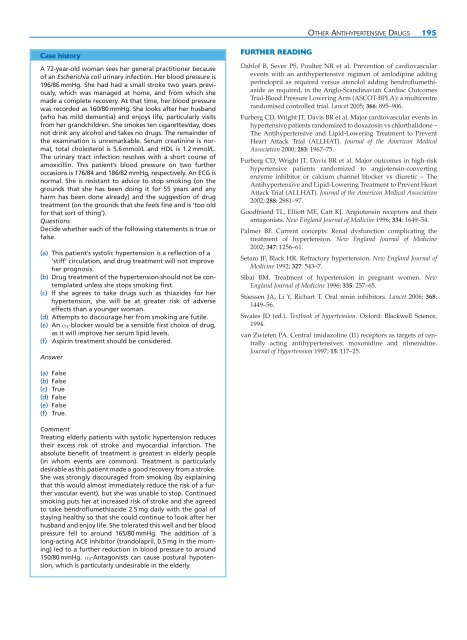A-Textbook-of-Clinical-Pharmacology-and-Therapeutics-5th-edition
A-Textbook-of-Clinical-Pharmacology-and-Therapeutics-5th-edition
A-Textbook-of-Clinical-Pharmacology-and-Therapeutics-5th-edition
Create successful ePaper yourself
Turn your PDF publications into a flip-book with our unique Google optimized e-Paper software.
OTHER ANTIHYPERTENSIVE DRUGS 195<br />
Case history<br />
A 72-year-old woman sees her general practitioner because<br />
<strong>of</strong> an Escherichia coli urinary infection. Her blood pressure is<br />
196/86 mmHg. She had had a small stroke two years previously,<br />
which was managed at home, <strong>and</strong> from which she<br />
made a complete recovery. At that time, her blood pressure<br />
was recorded as 160/80 mmHg. She looks after her husb<strong>and</strong><br />
(who has mild dementia) <strong>and</strong> enjoys life, particularly visits<br />
from her gr<strong>and</strong>children. She smokes ten cigarettes/day, does<br />
not drink any alcohol <strong>and</strong> takes no drugs. The remainder <strong>of</strong><br />
the examination is unremarkable. Serum creatinine is normal,<br />
total cholesterol is 5.6 mmol/L <strong>and</strong> HDL is 1.2 mmol/L.<br />
The urinary tract infection resolves with a short course <strong>of</strong><br />
amoxicillin. This patient’s blood pressure on two further<br />
occasions is 176/84 <strong>and</strong> 186/82 mmHg, respectively. An ECG is<br />
normal. She is resistant to advice to stop smoking (on the<br />
grounds that she has been doing it for 55 years <strong>and</strong> any<br />
harm has been done already) <strong>and</strong> the suggestion <strong>of</strong> drug<br />
treatment (on the grounds that she feels fine <strong>and</strong> is ‘too old<br />
for that sort <strong>of</strong> thing’).<br />
Questions<br />
Decide whether each <strong>of</strong> the following statements is true or<br />
false.<br />
(a) This patient’s systolic hypertension is a reflection <strong>of</strong> a<br />
‘stiff’ circulation, <strong>and</strong> drug treatment will not improve<br />
her prognosis.<br />
(b) Drug treatment <strong>of</strong> the hypertension should not be contemplated<br />
unless she stops smoking first.<br />
(c) If she agrees to take drugs such as thiazides for her<br />
hypertension, she will be at greater risk <strong>of</strong> adverse<br />
effects than a younger woman.<br />
(d) Attempts to discourage her from smoking are futile.<br />
(e) An α 1 -blocker would be a sensible first choice <strong>of</strong> drug,<br />
as it will improve her serum lipid levels.<br />
(f) Aspirin treatment should be considered.<br />
Answer<br />
FURTHER READING<br />
Dahl<strong>of</strong> B, Sever PS, Poulter NR et al. Prevention <strong>of</strong> cardiovascular<br />
events with an antihypertensive regimen <strong>of</strong> amlodipine adding<br />
perindopril as required versus atenolol adding bendr<strong>of</strong>lumethiazide<br />
as required, in the Anglo-Sc<strong>and</strong>inavian Cardiac Outcomes<br />
Trial-Blood Pressure Lowering Arm (ASCOT-BPLA): a multicentre<br />
r<strong>and</strong>omised controlled trial. Lancet 2005; 366: 895–906.<br />
Furberg CD, Wright JT, Davis BR et al. Major cardiovascular events in<br />
hypertensive patients r<strong>and</strong>omized to doxazosin vs chlorthalidone –<br />
The Antihypertensive <strong>and</strong> Lipid-Lowering Treatment to Prevent<br />
Heart Attack Trial (ALLHAT). Journal <strong>of</strong> the American Medical<br />
Association 2000; 283: 1967–75.<br />
Furberg CD, Wright JT, Davis BR et al. Major outcomes in high-risk<br />
hypertensive patients r<strong>and</strong>omized to angiotensin-converting<br />
enzyme inhibitor or calcium channel blocker vs diuretic – The<br />
Antihypertensive <strong>and</strong> Lipid-Lowering Treatment to Prevent Heart<br />
Attack Trial (ALLHAT). Journal <strong>of</strong> the American Medical Association<br />
2002; 288: 2981–97.<br />
Goodfriend TL, Elliott ME, Catt KJ. Angiotensin receptors <strong>and</strong> their<br />
antagonists. New Engl<strong>and</strong> Journal <strong>of</strong> Medicine 1996; 334: 1649–54.<br />
Palmer BF. Current concepts: Renal dysfunction complicating the<br />
treatment <strong>of</strong> hypertension. New Engl<strong>and</strong> Journal <strong>of</strong> Medicine<br />
2002; 347: 1256–61.<br />
Setaro JF, Black HR. Refractory hypertension. New Engl<strong>and</strong> Journal <strong>of</strong><br />
Medicine 1992; 327: 543–7.<br />
Sibai BM. Treatment <strong>of</strong> hypertension in pregnant women. New<br />
Engl<strong>and</strong> Journal <strong>of</strong> Medicine 1996; 335: 257–65.<br />
Staessen JA, Li Y, Richart T. Oral renin inhibitors. Lancet 2006; 368:<br />
1449–56.<br />
Swales JD (ed.). <strong>Textbook</strong> <strong>of</strong> hypertension. Oxford: Blackwell Science,<br />
1994.<br />
van Zwieten PA. Central imidazoline (I1) receptors as targets <strong>of</strong> centrally<br />
acting antihypertensives: moxonidine <strong>and</strong> rilmenidine.<br />
Journal <strong>of</strong> Hypertension 1997; 15: 117–25.<br />
(a) False<br />
(b) False<br />
(c) True<br />
(d) False<br />
(e) False<br />
(f) True.<br />
Comment<br />
Treating elderly patients with systolic hypertension reduces<br />
their excess risk <strong>of</strong> stroke <strong>and</strong> myocardial infarction. The<br />
absolute benefit <strong>of</strong> treatment is greatest in elderly people<br />
(in whom events are common). Treatment is particularly<br />
desirable as this patient made a good recovery from a stroke.<br />
She was strongly discouraged from smoking (by explaining<br />
that this would almost immediately reduce the risk <strong>of</strong> a further<br />
vascular event), but she was unable to stop. Continued<br />
smoking puts her at increased risk <strong>of</strong> stroke <strong>and</strong> she agreed<br />
to take bendr<strong>of</strong>lumethiazide 2.5 mg daily with the goal <strong>of</strong><br />
staying healthy so that she could continue to look after her<br />
husb<strong>and</strong> <strong>and</strong> enjoy life. She tolerated this well <strong>and</strong> her blood<br />
pressure fell to around 165/80 mmHg. The addition <strong>of</strong> a<br />
long-acting ACE inhibitor (tr<strong>and</strong>olapril, 0.5 mg in the morning)<br />
led to a further reduction in blood pressure to around<br />
150/80 mmHg. α 1 -Antagonists can cause postural hypotension,<br />
which is particularly undesirable in the elderly.


